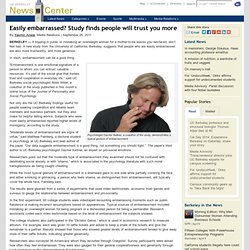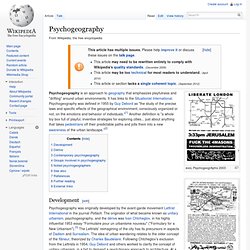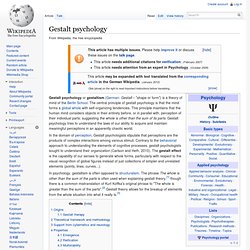

Easily embarrassed? Study finds people will trust you more. If tripping in public or mistaking an overweight woman for a mother-to-be leaves you red-faced, don’t feel bad.

A new study from the University of California, Berkeley, suggests that people who are easily embarrassed are also more trustworthy, and more generous. In short, embarrassment can be a good thing. Pattern recognition. Pattern recognition algorithms generally aim to provide a reasonable answer for all possible inputs and to perform "most likely" matching of the inputs, taking into account their statistical variation.

This is opposed to pattern matching algorithms, which look for exact matches in the input with pre-existing patterns. A common example of a pattern-matching algorithm is regular expression matching, which looks for patterns of a given sort in textual data and is included in the search capabilities of many text editors and word processors. In contrast to pattern recognition, pattern matching is generally not considered a type of machine learning, although pattern-matching algorithms (especially with fairly general, carefully tailored patterns) can sometimes succeed in providing similar-quality output to the sort provided by pattern-recognition algorithms.
Overview[edit] Probabilistic classifiers[edit] They output a confidence value associated with their choice. . To output labels . . . Where. Hypergraphy. Hypergraphy, also called hypergraphics and metagraphics, is a critical method developed by the Lettrist movement in the 1950s, which encompasses a synthesis of writing and other forms of media.[1] Isidore Isou, the founder of Lettrism, said that "Metagraphics or post-writing, encompassing all the means of ideographic, lexical and phonetic notation, supplements the means of expression based on sound by adding a specifically plastic dimension, a visual facet which is irreducible and escapes oral labelling...

"[2] Hypergraphy merges poetry (text) with more visual (graphic) ways of communication such as painting, illustration or signs. The technique was used in Lettrist painting and cinema, in which letters were drawn directly onto the film. See also[edit] References[edit] Jump up ^ Isou, Isidore (1964).
Further reading[edit] Psychogeography. EvoL PsychogeogrAphix 2003 evoL PsychogeogrAphix 2004 evoL PsychogeogrAphix 2005 Psychogeography is an approach to geography that emphasizes playfulness and "drifting" around urban environments.

It has links to the Situationist International. 8-Circuit Model of Consciousness. The eight-circuit model of consciousness is a theory proposed by Timothy Leary and expanded on by Robert Anton Wilson and Antero Alli.

The model describes eight circuits of information (eight "brains") that operate within the human nervous system. Each circuit is concerned with a different sphere of activity. Leary, Alli and Wilson have written about the model in depth and how each circuit operates, both in the lives of individual people and in societies. Skinner on Campus. 47 Mind-Blowing Psychology-Proven Facts You Should Know About Yourself.
I’ve decided to start a series called 100 Things You Should Know about People.

As in: 100 things you should know if you are going to design an effective and persuasive website, web application or software application. Or maybe just 100 things that everyone should know about humans! The order that I’ll present these 100 things is going to be pretty random. So the fact that this first one is first doesn’t mean that’s it’s the most important.. just that it came to mind first. Dr. <div class="slide-intro-bottom"><a href=" class="sl-start"> »</a></div>
Mirror stage. A toddler and a mirror.

Gestalt psychology. Gestalt psychology or gestaltism (German: Gestalt – "shape or form") is a theory of mind of the Berlin School.

The central principle of gestalt psychology is that the mind forms a global whole with self-organizing tendencies. This principle maintains that the human mind considers objects in their entirety before, or in parallel with, perception of their individual parts; suggesting the whole is other than the sum of its parts. Gestalt psychology tries to understand the laws of our ability to acquire and maintain meaningful perceptions in an apparently chaotic world. Wilhelm Wundt. Wilhelm Maximilian Wundt (16 August 1832 – 31 August 1920) was a German physician, physiologist, philosopher, and professor, known today as one of the founding figures of modern psychology.

Wundt, who noted psychology as a science apart from biology and philosophy, was the first person to ever call himself a Psychologist.[3] He is widely regarded as the "father of experimental psychology".[4][5] In 1879, Wundt founded the first formal laboratory for psychological research at the University of Leipzig. This marked psychology as an independent field of study.[6] By creating this laboratory he was able to explore the nature of religious beliefs, identify mental disorders and abnormal behavior, and find damaged parts of the brain.
In doing so, he was able to establish psychology as a separate science from other topics. He also formed the first journal for psychological research in the year 1881. Gestalt therapy. Gestalt therapy is an existential/experiential form of psychotherapy that emphasizes personal responsibility, and that focuses upon the individual's experience in the present moment, the therapist-client relationship, the environmental and social contexts of a person's life, and the self-regulating adjustments people make as a result of their overall situation.

§Overview[edit] Structuralism (psychology) Structuralism in psychology refers to a theory of consciousness developed by Wilhelm Wundt, and his mentee Edward B. Titchener that brought Wundt's idea to the United States. Depending on who you asked it will be said either of them formally began this field of psychology but it is certain that Titchener expanded on what Wundt originally provided, and was also responsible for bringing this idea to America. Structuralism as a school of psychology sought to analyze the adult mind (the sum total of experience from birth to the present) in terms of the simplest definable components and then to find how these components fit together to form more complex experiences as well as how they correlated to physical events.
Experience. Experience comprises knowledge of or skill of some thing or some event gained through involvement in or exposure to that thing or event.[1] The history of the word experience aligns it closely with the concept of experiment. For example, the word experience could be used in a statement like: "I have experience in fishing". The concept of experience generally refers to know-how or procedural knowledge, rather than propositional knowledge: on-the-job training rather than book-learning.
Philosophers dub knowledge based on experience "empirical knowledge" or "a posteriori knowledge". Edward B. Titchener. Biography[edit] Education and early life[edit] Titchener attended Malvern College and then went on to Oxford from 1885 to 1890. At Oxford, Titchener first began to read the works of Wilhelm Wundt. Zeitgeist. The Zeitgeist (spirit of the age or spirit of the time) is the intellectual fashion or dominant school of thought that typifies and influences the culture of a particular period in time. For example, the Zeitgeist of modernism typified and influenced architecture, art, and fashion during much of the 20th century.[1] The German word Zeitgeist is often attributed to the philosopher Georg Hegel, but he never actually used the word.
In his works such as Lectures on the Philosophy of History, he uses the phrase der Geist seiner Zeit (the spirit of his time)—for example, "no man can surpass his own time, for the spirit of his time is also his own spirit. Philosophy of history. The term philosophy of history refers to the theoretical aspect of history, in two senses. It is customary to distinguish critical philosophy of history from speculative philosophy of history . Critical philosophy of history is the "theory" aspect of the discipline of academic history, and deals with questions such as the nature of historical evidence, the degree to which objectivity is possible, etc.
Speculative philosophy of history is an area of philosophy concerning the eventual significance, if any, of human history. [ 1 ] Furthermore, it speculates as to a possible teleological end to its development—that is, it asks if there is a design, purpose, directive principle, or finality in the processes of human history. Georg Wilhelm Friedrich Hegel.
The birthplace of Hegel in Stuttgart, which now houses The Hegel Museum Georg Wilhelm Friedrich Hegel (German: [ˈɡeɔɐ̯k ˈvɪlhɛlm ˈfʁiːdʁɪç ˈheːɡəl]; August 27, 1770 – November 14, 1831) was a German philosopher, and a major figure in German Idealism. His historicist and idealist account of reality revolutionized European philosophy and was an important precursor to Continental philosophy and Marxism. Life[edit]